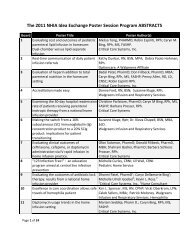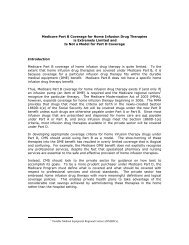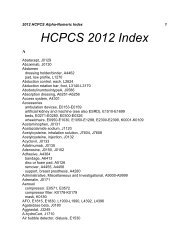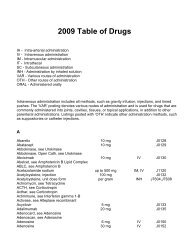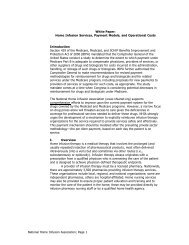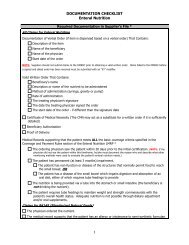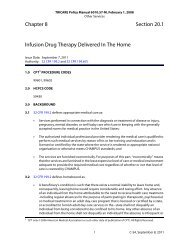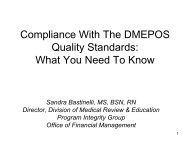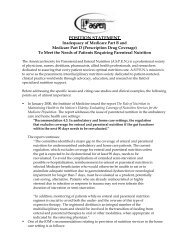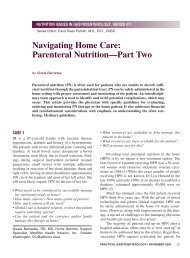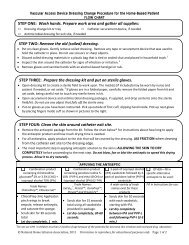Kaiser Family Foundation Survey on State Medicaid Managed Care ...
Kaiser Family Foundation Survey on State Medicaid Managed Care ...
Kaiser Family Foundation Survey on State Medicaid Managed Care ...
- No tags were found...
You also want an ePaper? Increase the reach of your titles
YUMPU automatically turns print PDFs into web optimized ePapers that Google loves.
Measuring, m<strong>on</strong>itoring, and improving quality in <strong>Medicaid</strong> managed careKey Secti<strong>on</strong> Findings:All states with MCOs and most states with PCCM programs require HEDIS© or other measuresof performance and CAHPS© or other surveys of patient experience. Required measures focusheavily <strong>on</strong> <strong>Medicaid</strong> priority areas such as prenatal and post-partum care, child health,preventive care, management of asthma, diabetes, and other chr<strong>on</strong>ic c<strong>on</strong>diti<strong>on</strong>s, and access.Of the 48 states with MCOs and/or PCCM programs, over a quarter also measure and m<strong>on</strong>itorquality in their fee-for-service delivery systems.Of the 36 states with MCOs, 16 require health plans to be accredited by a recognized nati<strong>on</strong>alaccrediting organizati<strong>on</strong>, such as NCQA, to participate in <strong>Medicaid</strong>.Over three-fourths of states with MCOs publicly report <strong>on</strong> the quality of their MCOs, and half ofPCCM states publish quality reports <strong>on</strong> their PCCM programs. A smaller number of states alsopublicly report <strong>on</strong> PHP performance. Sixteen states with MCOs reported that they prepare aquality report card, using HEDIS©, CAHPS©, and state-specific measures, that <strong>Medicaid</strong>beneficiaries can use to compare and choose health plans.Quality improvement projects in the states with MCOs reveal the breadth of state priorities,including, am<strong>on</strong>g others, improved birth outcomes, increased access to pediatric subspecialists,identificati<strong>on</strong> of high-risk individuals for case management, and coordinati<strong>on</strong> betweenbehavioral health and medical providers.<strong>Managed</strong> care provides a platform for states to ensure the quality of care for <strong>Medicaid</strong> beneficiaries.Federal regulati<strong>on</strong>s define requirements that both states and health plans must meet to measure,m<strong>on</strong>itor, ensure, and improve the quality of care provided to <strong>Medicaid</strong> beneficiaries enrolled in riskbasedmanaged care, including both MCOs and n<strong>on</strong>-comprehensive PHPs. Each state c<strong>on</strong>tracting withplans must have a written quality strategy that includes specified elements, including nati<strong>on</strong>alperformance measures, and must, through its c<strong>on</strong>tracts, ensure plan compliance with standards set bythe state. C<strong>on</strong>tracts with plans must require <strong>on</strong>going quality assessment and performance improvementprojects (PIP), and submissi<strong>on</strong> of performance data to the state; states must also arrange for annualexternal reviews of the quality, appropriateness, and timeliness of services furnished to <strong>Medicaid</strong>enrollees. Similar requirements do not exist for fee-for-service.With electr<strong>on</strong>ic data increasingly available <strong>on</strong> many aspects of utilizati<strong>on</strong>, clinical outcomes, and patientexperience, states have growing opportunities to examine health plan and health system performanceacross a broad spectrum of quality-related measures. <strong>Managed</strong> care offers a structure in whichperformance can be measured and enforced. Through managed care c<strong>on</strong>tracts, states can specifybenchmarks for acceptable performance and hold health plans accountable for their achievement, andstructure payment to reward (or penalize) good (or poor) performance. The survey asked states anumber of questi<strong>on</strong>s c<strong>on</strong>cerning the nature and breadth of current and planned activity aimed atmeasuring and improving quality in <strong>Medicaid</strong>.Appendix 12 provides a summary of states’ use of selected quality tools.Of the 36 states with MCOs, 16 require that risk-based plans be accredited to participate in <strong>Medicaid</strong>.One means by which states can assure quality in risk-based plans is to require that, as a c<strong>on</strong>diti<strong>on</strong> ofparticipating in <strong>Medicaid</strong>, they obtain accreditati<strong>on</strong> from a nati<strong>on</strong>al accrediting body, such as the33



